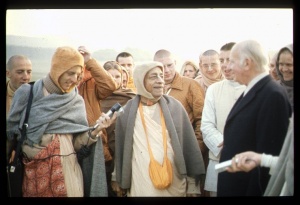SB 4.1.24

A.C. Bhaktivedanta Swami Prabhupada
TEXT 24
praṇamya daṇḍavad bhūmāv
upatasthe 'rhaṇāñjaliḥ
vṛṣa-haṁsa-suparṇa-sthān
svaiḥ svaiś cihnaiś ca cihnitān
SYNONYMS
praṇamya—offering obeisances; daṇḍa-vat—like a rod; bhūmau—ground; upatasthe—fell down; arhaṇa—all paraphernalia for worship; añjaliḥ—folded hands; vṛṣa—bull; haṁsa—swan; suparṇa—the Garuḍa bird; sthān—situated; svaiḥ—own; svaiḥ—own; cihnaiḥ—by symbols; ca—and; cihnitān—being recognized.
TRANSLATION
Thereafter he began to offer prayers to the three deities, who were seated on different carriers—a bull, a swan and Garuḍa—and who held in their hands a drum, kuśa grass and a discus. The sage offered them his respects by falling down like a stick.
PURPORT
Daṇḍa means "a long rod," and vat means "like." Before a superior, one has to fall down on the ground just like a stick, and this sort of offering of respect is called daṇḍavat. Atri Ṛṣi offered his respect to the three deities in that way. They were identified by their different carriers and different symbolic representations. In that connection it is stated here that Lord Viṣṇu was sitting on Garuḍa, a big aquiline bird, and was carrying in His hand a disc, Brahmā was sitting on a swan and had in his hand kuśa grass, and Lord Śiva was sitting on a bull and carrying in his hand a small drum called a ḍamaru. Atri Ṛṣi recognized them by their symbolic representations and different carriers, and thus he offered them prayers and respects.